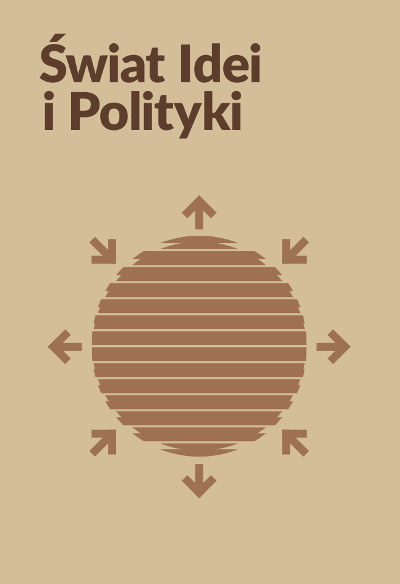The current state and the future of political science in Poland in the opinions of the members of political science community
DOI:
https://doi.org/10.34767/SIIP.2024.01.04Keywords:
science of politics and administration, Polish science, social sciences, political science, developmentAbstract
The article presents the results of pilot study, which aim was to deter mine how polish political science scholars perceive their scientific discipline and its future, and what are their opinions on desirable directions of changes within political science. The questions used in the survey concerned the following issues, important in the context of the title matter: the attitude of Polish political scientists towards their scientific discipline, and relating to its current state; the perception of problems and challenges the discipline is facing; the issues relating to the organization of the discipline and its place in the system of science and the system of scientific disciplines; the aims and methods of conducting political research; the aims of teaching of political science; pro-integrative actions of the political science community. For the purposes of the study the following hypotheses were formulated: H1: Polish political science community is aware of the problems and challenges their discipline is facing; H2: the perception of the problems and challenges Polish political science is facing actually corresponds with the objective current conditions of the discipline; H3: political science community knows what should be done to effectively address certain problems and challenges to ensure the discipline improvement of its state and further development – and it is able to formulate potential solutions relating to this matter. The data collected with the survey allowed to reconstruct the image of beliefs concerning the discipline of political science and administration, its current state and future development, as well as – as it had been assumed – it provided the basis for further in-depth meta-scientific research.
References
Blok, Z. (2013). Drogi poszukiwania tożsamości „nauki o polityce”. Przegląd Politologiczny, 4, 39–58.
Blok, Z. (2017). Procesy dewastujące status przedmiotowy politologii w Polsce. W: A. Czajowski i in. (red.), Zjawiska polityczne w perspektywie teoretycznej. Księga jubileuszowa dedykowana Profesorowi Andrzejowi W. Jabłońskiemu (s. 13–38). Wrocław: Instytut Politologii Uniwersytetu Wrocławskiego.
Blok, Z. (2020). Spory wokół istoty i statusu metod badań politologicznych. W: F. Pierzchalski, M. Tobiasz & J. Ziółkowski (red.), Podmiot – kultura – socjotechnika. Wokół holistycznej interpretacji polityki. Księga jubileuszowa dedykowana Profesorowi zw. dr hab. Mirosławowi Karwatowi (s. 433–458). Warszawa: Dom Wydawniczy ELIPSA.
Chodubski, A. (2017). Kierunki i specyfika współczesnych badań politologicznych w Polsce. W: T. Domański, A. Stępień-Kuczyńska & A. Włodarska-Frykowska (red.), Internacjonalizacja polskich ośrodków politologicznych (s. 21–35). Łódź: Wydawnictwo Uniwersytetu Łódzkiego.
Eisfeld, R. (2012). Radical Approaches to Political Science. Roads Less Traveled. Opladen – Berlin – Toronto: Barbara Budrich Publishers.
Eisfeld, R. & Pal, L.A. (2010). Political Science in Central-East Europe. Diversity and Convergence. Opladen: Barbara Budrich Publishers.
Filipowicz, S. (2017). Nauka i reformatorzy. Kilka uwag na temat przeprowadzonych w Polsce reform. Studia Politologiczne, 46, 184–197.
Filipowicz, S. (2022). Uniwersytet jako izba przemysłowo-handlowa? W: M. Karwat & F. Pierzchalski (red.), Uniwersytet i nauka o polityce. Sprawdziany tożsamości (s. 165–174). Warszawa: Oficyna Wydawnicza ASPRA-JR.
Goodin, R.E. (2011). The State of the Discipline, the Discipline of the State. W: R.E. Goodin (ed.), The Oxford Handbook of Political Science (s. 2–57). Oxford: Oxford University Press.
Karwat, M. & Pierzchalski, F. (2022). Wstęp. W: M. Karwat & F. Pierzchalski (red.), Uniwersytet i nauka o polityce. Sprawdziany tożsamości (s. 7–13). Warszawa: Oficyna Wydawnicza ASPRA-JR.
Klementewicz, T. (2013). Politolog w labiryncie paradygmatów – pułapki eklektyzmu. W: B. Krauz-Mozer & P. Ścigaj (red.), Podejścia badawcze i metodologiczne w nauce o polityce (s. 31–43). Kraków: Księgarnia Akademicka.
Krauz-Mozer, B., Borowiec, P. & Ścigaj, P. (2011). Kim jesteś politologu? Historia i stan dyscypliny w Polsce. Tom 1 i 2. Kraków: Wydawnictwo Uniwersytetu Jagiellońskiego.
Łubiński, P., Jarząbek-Krysiak, P. & Dubiński, P. (2015). Różne oblicza politologii. Teoria – historia – wizerunek. Olsztyn – Stalowa Wola: Katolicki Uniwersytet Lubelski.
Nocoń, J. (2008). Współczesne dylematy politologicznej profesji. W poszukiwaniu tożsamości nauki o polityce. Świat Idei i Polityki, 8, 84–101.
Obacz, P. (2020). Zarządzanie rozwojem kompetencji nauczycieli akademickich: między wsparciem i rozwojem dydaktyki a biurokratyzmem i politykierstwem. W: A. Sajdak-Burska & I. Maciejowska (red.), Profesjonalizacja roli nauczyciela akademickiego (s. 169–179). Kraków: Wydawnictwo Uniwersytetu Jagiellońskiego.
Ozimek-Hanslik, M. (2020). Politologia a debata o polityczności. Próba reasumpcji. W: F. Pierzchalski, M. Tobiasz & J. Ziółkowski (red.), Wokół holistycznej interpretacji polityki. Księga jubileuszowa dedukowana Profesorowi zw. dr hab. Mirosławowi Karwatowi (s. 75–92). Warszawa: Dom Wydawniczy ELIPSA.
Political Science in the 21st Century. Report of the Task Force on Political Science in the 21st Century. October 2011. Pobrano z lokalizacji: https://www.apsanet.org/
Pierzchalski, F. (2018). „Peryferyjność” polskiej politologii na tle heterogeniczności naukowego poznania. W: S. Sulowski (red.), Nauki o polityce 2.0. Kontrowersje i konfrontacje (s. 99–119). Warszawa: Dom Wydawniczy ELIPSA.
Pierzchalski, F. (2022a). Politolog na rozdrożu: między opium kapitalistycznych filistrów a postawą krytyczną. W: M. Karwat & F. Pierzchalski (red.), Uniwersytet i nauka o polityce. Sprawdziany tożsamości (s. 221–240). Warszawa: Oficyna Wydawnicza ASPRA-JR.
Pierzchalski, F. (2022b). Wprowadzenie sporządzone na potrzeby panelu Status teoretyczny i metodologiczny politologii w ramach konferencji Politologia teoretyczna w Polsce. Bilans 50-lecia. Pobrano z lokalizacji: https://wnpid.amu.edu.pl/
Skarżyński, R. (2012). Podstawowy dylemat politologii: dyscyplina nauki czy potoczna wiedza o społeczeństwie? O tradycji uniwersytetu i demarkacji wiedzy. Białystok: Temida2.
Szewczak, W. (2017). Struktura wiedzy teoretycznej a przedmiot badania politologii. Studia Politologiczne, 46, s. 48–74.
Ścigaj, P. (2010). Granice w politologii jako wyznacznik tożsamości dyscypliny. Athenaeum. Polskie Studia Politologiczne, 26, 32–50.
Witkowski, L. (2022). Dwanaście „grzechów głównych” w nauce i na uczelniach (przed J. Gowinem i po nim). Zdanie. Pismo Stowarzyszenia Kuźnica, 3(194), 42–50.


